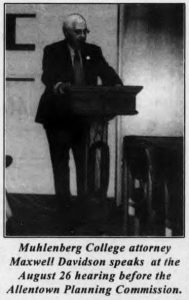
As many of us know, Allentown government is currently debating a new expansion of the Muhlenberg Student Residence Overlay District. Simply speaking, the overlay gives Allentown officials the ability to restrict the number of students living in a home that falls in the zone. This decision, however, is one that has faced the college before. Almost exactly 20 years ago today, the College was fighting the initial inception of the ordinance, which was eventually passed mid-October, 1997. Though similar to its contemporary form, the original ordinance did have some differences, and was met with much stronger opposition by the college.
The story originally broke on September 4, 1997, with the first sentence of the front page article reading “The future of ‘off-campus’ living will become endangered if Ordinance No. 59 passes.” On August 26, the Allentown City Planning Commission held a hearing to discuss the proposed zoning change. At this initial meeting, supporters of Ordinance 59 claimed that off campus students contributed “noise, litter, overcrowding, and parking problems to the area.” The college disagreed with this wholly, having students, alumni, and administration present at the meeting. Former Dean of Admissions Chris Hooker-Haring gave an impassioned speech, claiming “fifty years ago, residents might have done the same thing by appearing before you with zoning restrictions. Except this time, these residents might have wanted to restrict Blacks and Puerto-Ricans from their neighborhood.” Allentown resident Bob Freed ardently disagreed with Hooker-Haring, stating “by law, students are not a discriminated class. Zoning laws restrict; they do not discriminate.” With both sides so passionately opposing the other’s, it was clear to all that this would be a lengthy process.
The story remained relatively quiet apart from the occasion inclusion in a letter to the editor. It wasn’t until the September 25, 1997 issue that the headline proudly read, “College wins fight against City Council Ordinance No. 59.” The outcome of the vote the previous week was a tie at 3-3, which meant the ordinance was dead. This came as a shock to many, including then Mayor Bill Heydt. Heydt claimed “this neighborhood is being threatened. Considering our commitment to home ownership, we would be hypocrites if we ignored the issues that impact this neighborhood.” Heydt went on to attack Muhlenberg’s apparent shady opposition, claiming the college tried to “intimidate” him, published “full page ads in the newspaper containing inaccuracies and outright lies” and threatened both legal action and a boycott of non-compliant Allentown businesses. An unnamed resident shared this sentiment, saying the College will “say anything” to defeat Ordinance 59. They continued, saying, “on the one hand they are bullying you and on the other hand they are portraying the victim of abuse.”

The College obviously didn’t like such accusations, and stood their ground saying the ordinance was “discriminatory” to Muhlenberg students. Student Body president David Silber ‘98 claimed that the students were not rowdy, and instead “enjoy[ed] being part of the City of Allentown.” Lauren Ravit, Student Body Finance Chairperson, added to the discussion, telling Allentown residents that they “do not have a right to choose your neighbors.” The article ended on an optimistic note, telling readers that “can now look forward to the privileges and experiences of living off-campus.” This statement, however, would be challenged sooner than the College thought. In the same issue, the Student Council gave some tips to students living off-campus, including “introduce yourself,” “give them your phone number” and “if you have a party, encourage your friends to use your back door.”
Two weeks after the College declared victory, the October 23 headline was a full reversal, reading “City council ordinance limits off-campus housing.” The first line of the article shares the same sentiment, reading “what first seemed like a Muhlenberg victory quickly turned into a Muhlenberg defeat.” The article went on the explain that after a vote on a revised version of Ordinance 59 passed by a vote of 4-3, the College tried, and failed, to appeal the legality of the procedure used for the revote. The legality of the proceedings came into question after the return of councilman Ernest Toth. Toth was on vacation during the initial vote and, after expressing his disapproval in the result, called for amendments to be made to the ordinance and for a new vote to be made. After two minor amendments, the bill was reintroduced as new legislation. The College claimed the vote should be blocked because the council “did not give 30 days notice required to institute a piece of legislation.” College representatives like counsel Maxwell Davidson doubled down on their opposition, claiming the legislation is “unconstitutional” because it “discriminates against students.”
The salt to the wound came when it was revealed that the amendments and re-vote only came about after the College refused a compromise with the council and surrounding residents. The agreement would decrease the zoning region, allowing more unregulated houses. In turn, the college would “decrease the number of off-campus students by 36 over the next seven years.” Then President Taylor would go on to reject this compromise. Then Vice President of Public Relations Mike Bruckner claimed the compromised was “unfair,” and the College would “rather stand in opposition to a bad ordinance than accept a bad agreement.” With the agreement being decline, the ordinance continued to move up Allentown government.

Though the ordinance had officially passed, the problem was far from solved. The October 30, 1997 issue featured an article which started “it appears as though the community and Muhlenberg College are at war with one another in the west end of Allentown.” Surrounding residents felt as though the problem still persisted, and that the influx of students had created “problems and disturbances” that they could “just not handle any longer.” Mayor Heydt again sided with the residents of Allentown while also recognizing the importance of Muhlenberg to the city. Muhlenberg students called the ordinance “ridiculous,” and claimed that they felt “threatened by Allentown residents.” Again, talks of boycotts resurfaced, to which Mayor Heydt replied, “It doesn’t make any sense. If you boycott our city would you not want our fire trucks to come, or for us to send our ambulances?”
With the College seemingly resigned to its fate, the conversation ended there. Though the College fought tooth and nail 20 years ago, their approach is much more passive this time. In an interview with the Morning Call, Dean Gulati said that the college was neither endorsing nor opposing the expansion, saying, “These are students, and we’re trying to teach them to be adults,” she said. Though the result of the present expansion is still unsure, let’s all hope Muhlenberg’s new backseat approach causes much less waves through the Allentown community.
Karl Schultz is a Senior with a History major, German minor, and a certification in secondary education. He began writing for the Weekly his freshman year after his roommate, now Editor-in-Chief, forced him to. He mainly writes about Muhlenberg College's forgotten past through his "This Week in Muhlenberg History" segment.





















